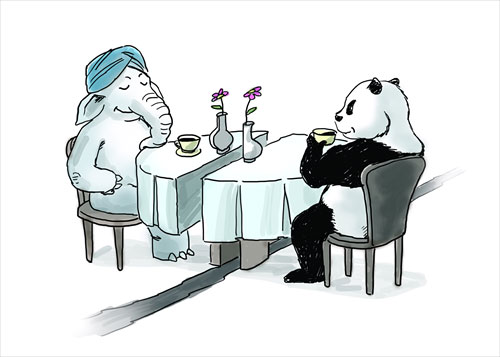 Ni Ni covers BAZAAR JEWELRY
Ni Ni covers BAZAAR JEWELRY
 Cherry blossoms reach peak bloom in Washington D.C.
Cherry blossoms reach peak bloom in Washington D.C.
 Top Chinese fashion icons in foreigners' eyes
Top Chinese fashion icons in foreigners' eyes
 Asia's largest business aviation exhibition to be held in Shanghai
Asia's largest business aviation exhibition to be held in Shanghai
 World's top-rated luxury hotels
World's top-rated luxury hotels
 Wu Jing, Xie Nan to hold wedding on May
Wu Jing, Xie Nan to hold wedding on May
 London Cake International attracts tourists
London Cake International attracts tourists
 Let's dance in harmonic Shaanxi
Let's dance in harmonic Shaanxi
 Christie's to auction dazzling diamonds
Christie's to auction dazzling diamonds
 'Model husband' shatters image of love
'Model husband' shatters image of love
 |
| Illustration: Liu Rui/GT |
The Henderson Brooks Report is an investigative report compiled by the Indian government examining the country's defeat in the 1962 border war with China. Though no longer confidential, it is still classified top secret by New Delhi.
In the past, the Congress party once covered up the reality about the border contention with China, distorted the history and misled the general public, in a bid to safeguard its position as the ruling party as well as the moral and just image of India in the international community.
Now the government is still attempting to conceal the contents of the report, citing its contents "are not only extremely sensitive but are of current operational value."
Indeed, the Sino-Indian border dispute is not only a key issue in their bilateral relations, but also an extremely sensitive topic in India's political circle.
India's military debacle once plunged the Congress party led by then prime minister Jawaharlal Nehru into unprecedented pressure and crisis.
Currently with the 16th Lok Sabha elections in full gear, Sino-Indian relations, and in particular the border dispute, may become a hot political issue even though foreign policy issues are often marginalized in Indian general elections.
The Congress-led United Progressive Alliance government has met vehement condemnation in its second term for sluggish economic growth, prohibitive inflation rate and flawed anti-corruption policies.
The Bharatiya Janata Party (BJP) has criticized the incumbent government for refusing to declassify the report, in an attempt to promote its own influence and quell the arrogance of the Congress party.
Indian media outlets and public opinion also tend to perceive Sino-Indian relations through the prism of the border conflict of more than 50 years ago.
The border row has long been agitating China-India bilateral ties, but what is reassuring is that the two nations have already achieved fruitful results in this connection during the past more than three decades, including an agreement based on common consensus in 2005, two important negotiation mechanisms in 2003 and 2012 respectively, and three border pacts in 1993, 1996 and 2013.
It is fair to say that Beijing and New Delhi have made remarkable breakthroughs in addressing the perplexing border dispute.
 Children in ancient costumes learn Zhusuan
Children in ancient costumes learn Zhusuan Tens of thousands celebrate Water Splashing Festival
Tens of thousands celebrate Water Splashing Festival A bite of China II whets the appetite
A bite of China II whets the appetite Chinese frigate completes its 14th escort mission
Chinese frigate completes its 14th escort mission Let's dance in wealthy Shaanxi
Let's dance in wealthy Shaanxi A date with 798: feel the art around you
A date with 798: feel the art around you 3D-printed houses built in Shanghai
3D-printed houses built in Shanghai World largest scale of umbrella dance
World largest scale of umbrella dance Cherry blossoms reach peak bloom in Washington D.C.
Cherry blossoms reach peak bloom in Washington D.C. The backstage of the Fashion Week
The backstage of the Fashion Week College students in Han costumes
College students in Han costumes Postgraduate works as waitress
Postgraduate works as waitress Life in a Lahu village in Yunnan
Life in a Lahu village in Yunnan An orphan’s wedding
An orphan’s wedding Hollywood documentary brings Diaoyu Islands truth to new audience
Hollywood documentary brings Diaoyu Islands truth to new audienceDay|Week|Month